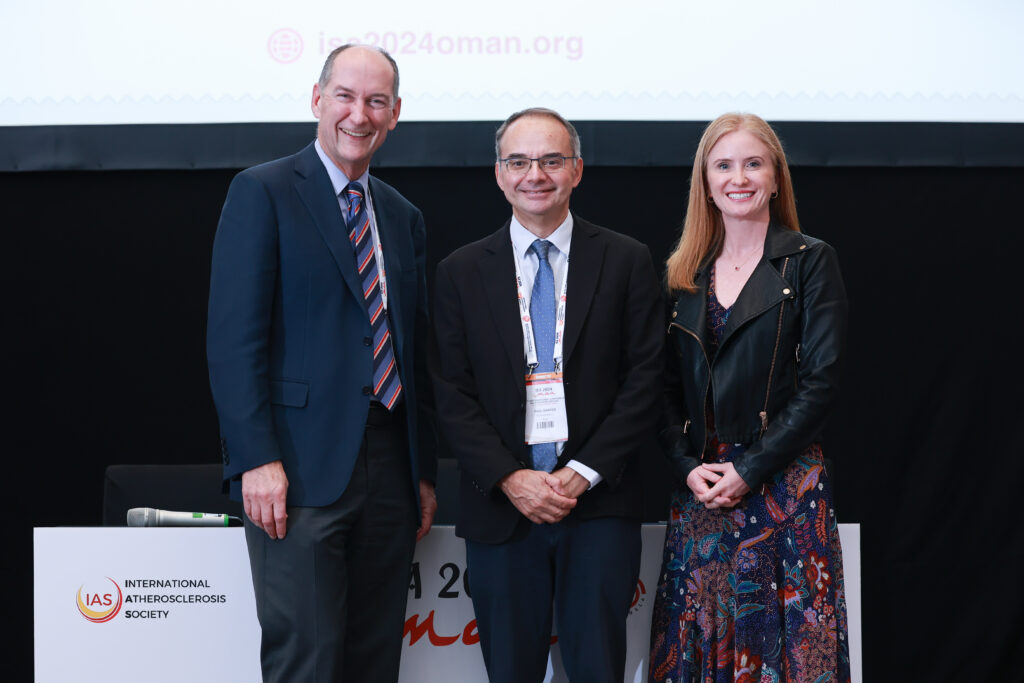
This event gathered health care professionals and patient advocates from around the world to explore how cutting-edge medicine can prevent, detect and manage cardiometabolic diseases like atherosclerosis. Over two days, attendees heard from experts on women’s cardiovascular health, gene therapies, clinical trial access, cholesterol management and more.
Presenting at the symposium, GAfPA’s Executive Director Brian Kennedy highlighted GAfPA’s mission and work to advance patient access in cardiovascular disease and related conditions. In his remarks, he advocated for a patient-centered health system that takes a holistic approach to care and prioritizes prevention and vigilance through greater prioritization of screening and early-stage treatment.
GAfPA called on patients and providers to work together to advocate for patient-centered care. “We take the patient voice and unite it with the health care provider voice to complement the data,” Susan Hepworth, Senior Director of GAfPA said during her presentation on including lived experience in shaping policy. Embedding the patient voice in health policy humanizes the statistics that inform policymakers’ decision-making. This approach, she said, could support patients in the rollout of national cardiovascular strategies that are more inclusive of cholesterol management.
Patient voices are powerful because they are authentic. What is not authentic, but still breaking through, is the onslaught of misinformation surrounding cholesterol management on social media. Brian Kennedy closed out the session with a presentation on how to combat cholesterol skeptics promulgating misinformation online. Influencers spew dangerous conspiracy theories and fake news capitalizing on confusing claims that the “body can heal itself” and other pseudoscience. For patients struggling with high cholesterol, this is particularly dangerous, as it allows them to ignore health guidance, undermine the clinician-patient relationship and sow distrust in health care systems.
The new digital age has enabled the spread of health misinformation. Providers, patient groups and other organizations need to produce localized, trusted evidence-based resources to empower patients with trusted sources of information.
Recent Posts

Global Alliance for Patient Access
© 2026 GAfPA. All Rights Reserved
| Cookie | Duration | Description |
|---|---|---|
| cookielawinfo-checkbox-analytics | 11 months | This cookie is set by GDPR Cookie Consent plugin. The cookie is used to store the user consent for the cookies in the category "Analytics". |
| cookielawinfo-checkbox-functional | 11 months | The cookie is set by GDPR cookie consent to record the user consent for the cookies in the category "Functional". |
| cookielawinfo-checkbox-necessary | 11 months | This cookie is set by GDPR Cookie Consent plugin. The cookies is used to store the user consent for the cookies in the category "Necessary". |
| cookielawinfo-checkbox-others | 11 months | This cookie is set by GDPR Cookie Consent plugin. The cookie is used to store the user consent for the cookies in the category "Other. |
| cookielawinfo-checkbox-performance | 11 months | This cookie is set by GDPR Cookie Consent plugin. The cookie is used to store the user consent for the cookies in the category "Performance". |
| viewed_cookie_policy | 11 months | The cookie is set by the GDPR Cookie Consent plugin and is used to store whether or not user has consented to the use of cookies. It does not store any personal data. |